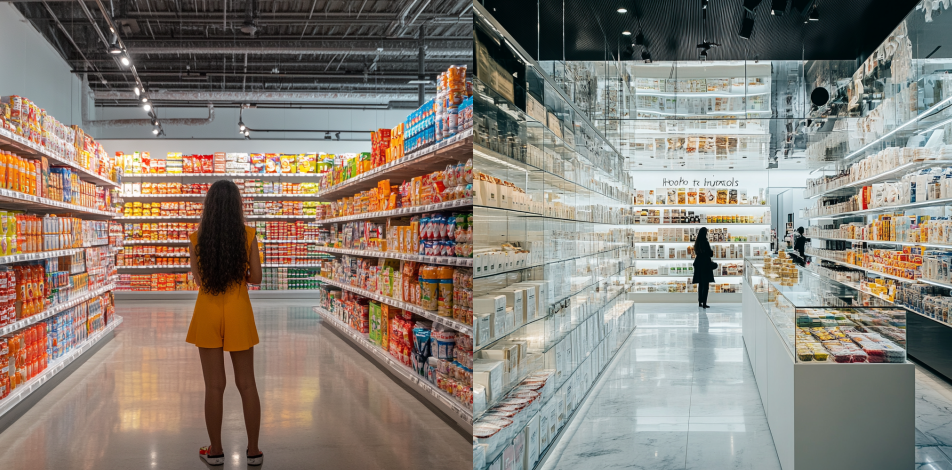Private label retail brands are making significant strides, capturing a growing share of the CPG market. Recent trends indicate that these store-branded products are not only gaining traction but are also being perceived as equal in quality to their national brand counterparts. The 2024 Private Label Report reveals that store brand sales surged by an impressive $10.1 billion from 2022, marking a record high.
The Surge in Private Label Brand Popularity
Consumer Perception of Quality: Nearly 70% of consumers believe that retail branded products are of equal quality to (and as familiar as) national brands. This perception shift is crucial for private label brands, as it helps bridge the gap between store brands and established consumer brands. The growing trust in the quality of private labels is driving more consumers to consider them as viable alternatives, often at a more competitive price point.
- Market Share: According to Nielsen, private label products accounted for 22.3% of all CPG sales in 2023, up from 21.5% in 2022. This increase underscores the growing acceptance of private label brands among consumers.
- Growth in Sales: The 2024 Private Label Report shows that store brand sales have skyrocketed by $10.1 billion from 2022, setting a new record. This substantial increase reflects a broader trend where consumers are increasingly opting for private labels as their preferred choice.
- Revenue Impact: The total revenue for private label products in 2023 was $143 billion, compared to $133 billion in 2022. This represents a 7.6% increase in revenue, highlighting the rapid growth of private label brands.
- Retailer Performance: A report by IRI indicates that private label sales grew by 6.5% year-over-year in 2023, compared to a 4.2% increase for national brands, further illustrating the momentum behind store brands.
Factors Driving the Growth of Private Label Brands
- Enhanced Quality and Innovation: Retailers have invested significantly in enhancing the quality and innovation of their private label products. Modern private labels often feature high-quality ingredients, cutting-edge packaging, and diverse product lines that cater to evolving consumer preferences.
- Product Development: According to a study by Private Label Manufacturers Association (PLMA), 64% of retailers have increased their investment in private label product development, leading to improvements in quality and variety.
- Competitive Pricing: One of the primary attractions of private label products is their competitive pricing. Retailers can offer store brands at lower prices compared to national brands, making them an appealing option for cost-conscious consumers.
- Price Advantage: A 2023 report from Mintel found that private label products are typically 20-30% cheaper than comparable national brands, which significantly boosts their appeal among budget-conscious shoppers.
Personalisation and Exclusivity: Retailers are leveraging private labels to offer exclusive and personalised products that cater to specific customer needs and preferences. Market Differentiation: Research by McKinsey & Company shows that 55% of consumers are willing to pay a premium for personalised products, highlighting the growing demand for bespoke offerings within the private label sector.
Loyalty Programs Across Retail Channels: As more online and in-store retailers introduce loyalty programs, private label brands stand to benefit significantly. These programs incentivise repeat purchases by offering rewards, discounts, and exclusive deals on store-branded products.
- Loyalty Engagement: A study by Loyalty360 found that 68% of consumers are more likely to purchase store brand products if they are part of a loyalty program that offers rewards or discounts.
- Enhanced Customer Experience: Loyalty programs enhance the overall shopping experience by providing personalised offers and rewards tailored to individual preferences.
- Customer Retention: According to a survey by Colloquy, businesses with robust loyalty programs see a 30% increase in customer retention rates, which directly contributes to higher private label sales.
- Data-Driven Insights: Loyalty programs generate valuable data on consumer preferences and purchasing behaviour, allowing retailers to refine their private label offerings.
- Data Utilisation: A report from Forrester Research highlights that 75% of retailers use data from loyalty programs to personalise marketing efforts and product recommendations, enhancing the appeal of private labels.
Impact on the Retail Landscape
- Increased Competition: The rise of private label brands is intensifying competition within the CPG sector. National brands are now facing a stronger challenge from store brands that offer similar quality at lower prices.
- Competitive Pressure: According to Euromonitor International, private label brands are expected to account for 24% of the CPG market share by 2025, increasing competitive pressure on national brands.
- Consumer Choice and Satisfaction: The growth of private label brands provides consumers with more choices and enhances overall satisfaction.
- Consumer Preference: A survey by The Harris Poll found that 78% of consumers feel that private label products offer good value for money, which contributes to higher satisfaction levels.
- Retailer Strategy and Adaptation: Retailers are adapting their strategies to capitalise on the success of private label brands. This includes investing in product development, enhancing marketing efforts, and expanding private label portfolios.
- Strategic Focus: According to a report by Deloitte, 62% of retailers plan to increase their focus on private label products in the next five years, indicating a strategic shift towards leveraging store brands.
Private label retail brands are experiencing unprecedented growth, driven by consumer perceptions of equal quality, competitive pricing, and effective loyalty programs. The $10.1 billion increase in store brand sales from 2022 highlights the significant impact of this trend on the CPG market. As private labels continue to gain traction, they are reshaping the retail landscape, intensifying competition, and offering consumers more choices. Retailers that embrace this trend and invest in their private label offerings are well-positioned to thrive in an increasingly dynamic market.

